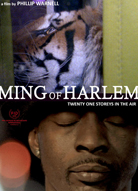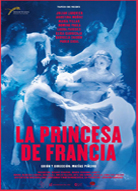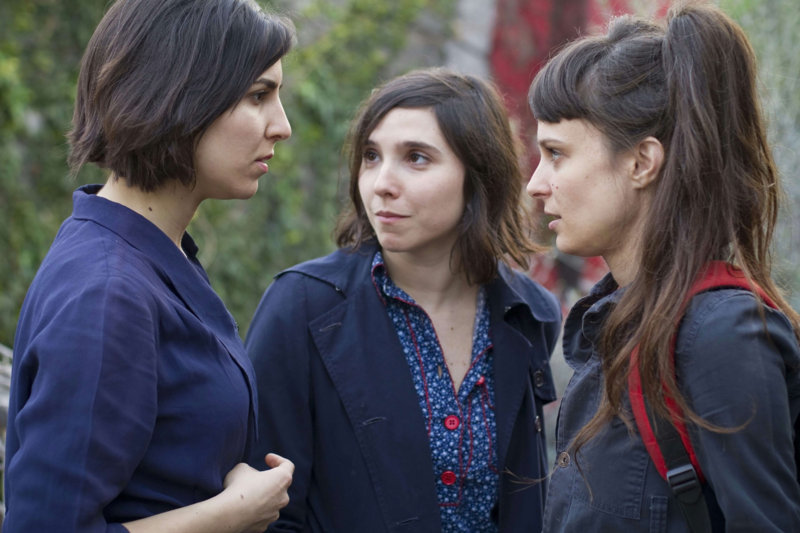NYFF: A Tiger and a Princess (or Two) Walk Into a Cafe...
 Friday, October 3, 2014 at 10:40AM
Friday, October 3, 2014 at 10:40AM NYFF continues. Here's Nathaniel with brief takes on three films...
Allow me to break a rule of film criticism. Rather than wag fingers at directors/films and call them "pretentious!" (a common and near-useless criticism for films with ambitions) or "opaque" (a beautiful adjective, less judgmental but still descriptive of the "ummm..." effect), I shall simply admit that sometimes I don't get it. I think we all have these cases, whether it be films/genres or even entire filmographies that are headscratchers to us whilst others drool. Most people are loathe to admit it lest they seem dumb but I don't have time to worry about that. Way too busy for that particular insecurity. Especially with all the room in my schedule I make for the other ones.
 I'm pairing these three films (Ming of Harlem, The Princess of France, and Hill of Freedom) for that reason and also because they all have "of" in the title. Deep reasons. Here we go...
I'm pairing these three films (Ming of Harlem, The Princess of France, and Hill of Freedom) for that reason and also because they all have "of" in the title. Deep reasons. Here we go...
MING OF HARLEM
Ming is a tiger. Harlem is Harlem.
This documentary is about a 400 lb tiger that was once living in a Harlem skyrise not too far from where I live. My cat lives with me in a Harlem skyrise, too, but he's only 11 lbs. The film is part of the "Projection" series at NYFF. That's a potentially less offputting title for a swath of moviegoers than "Views from the Avant Garde" which is what it used to be called. Having seen the picture, I'm not sure I understand what's avante garde about it?
Perhaps it's the lack of talking heads projecting emotions on to animals OR explaining the psychology of the man who housed them until he was sent to prison for doing just that. Perhaps it's the very sparse insertion of local and national news footage from the time of the scandal, of which there is surely a lot more. The movie is, in part, more of a meditative look at two animals; the tiger shared his apartment with a full grown alligator albeit not in the same room...

Contemplative cinema is fine when it doesn't overstay it's welcome and this one clocks in at a reasonable 77 minutes. I had real difficulty with Nenette, a documentary a few years back about a famous orangutan in the Paris zoo. It's from the same school of "just watch these beautiful animals" but it was ENDLESS, looking at a sad orangutan whose facial expressions rarely varied while people tried to project human feelings on to her in voiceover. Ming of Harlem is far less painful, unless you have an aversion to Björk-impersonators reading poetry about "lords of forests and rivers" and "animal words not learned or swallowed" over closeups of spooky alligator eyes or lengthy shots of a tiger casually spraying piss all over his human's bathroom.
Antoine, the man who housed them talks enough to sound sane, if misguided, which was disturbing in his own way. He details feeding rituals ('and we fast on Sundays') and rationalizations at one point comparing his tiger friend (WHO HE SLEPT WITH IN THE SAME BED) to people who have birds in cages in their apartment. Toward the end of the documentary the human vanishes and what we're left with is quite a lot of footage of a tiger and alligator wandering from one side of their unnatural habitat to another, shots that we assume are staged and recreated to look like their former home. I had feelings while watching this picture -- anything cats does that to me -- though my feelings about the film didn't venture out from the twin dichotomous polls of 'continually interested' and 'continually annoyed'.
HILL OF FREEDOM
Hill of Freedom is actually the name of a cafe in the movie. It's also possibly on a hill.

One of my not-so favorite NYFF experiences of years past was sitting through Hong Sang-soo's 2010 NYFF entry in Oki's Movie. I found it tedious, non-insightful and banal but especially lazily shot. Imagine my surprise when afterwards I learned that the director, with whom I was not yet familiar, was a regular presence at NYFF and highly respected. I avoided the next feature (which Jose loved right here) but I attended this one to give him or maybe myself another chance at getting it. This pleasingly short comedy (66 minutes!) is about a Japanese man in Korea looking for a woman he thinks he might be in love with who he once taught in a language class. She has not answered his letters. As the letters were sometimes read aloud over banal images, I braced myself for the worst. Again the filmmaking seemed random and, well, cheap to me really; the sound isn't much better than YouTube video with its ambient noise and rough edits. But in this case the laidback conversations were more obviously pitched for comedy and some of the cross-culture jokes were actually quite funny and the scrambled timeline was actually also employed in mildly clever ways. A couple of shots, while not exactly masterful, made me grateful for how wide or tight he held the camera on the people or animals in the scene as punchline (there's a dog that factors in rather humourously and I loved a segment about an unordered piece of cake).
I liked this picture quite a lot more than my first experience with this auteur. Even the opening titles are happy with bright blue and yellow colors and jingly music. But when the dialogue wasn't funny it was dull and while the story was simplistically engaging it was never exciting to watch. I still don't understand this aggressively casual filmmaker's reputation but this was a painless watch and funny, too.
 PRINCESS OF FRANCE
PRINCESS OF FRANCE
Princess refers to... I'm not sure who or what actually. And France... I don't know either since it's set in Buenos Aires. Oh, but wait! "Love's Labour's Lost" is performed within so Princess of France refers to the actual person, as envisioned by Shakespeare and reinterpreted by Matias Pienoro. Lucky for you I believe one of the other guys will actually review this one. I think I was way too tired for this movie!
And the best of the lot! The primary difference this time being that it's the kind of movie wherein you KNOW there's something to get that escaped you and you're certain that the movie would be even more pleasureable if you could be inside it again to suss it all out. (This puts it far above the kind of movie you generally don't get that you actually suspect isn't worth getting.) As far as I can tell this movie is about a player named Victor who has basically bedded all the ladies in his theater troupe and then left for Mexico for a year. When he returns he attempts, vaguely, to reignite (or not) some of those relationships and also hires some of them to play their stage roles again for a radio production of Love's Labour's Lost. This sounds like a basic enough setup, it's true, but it's awfully hard to keep up. The movie spins in circles, sometimes repeating scenes more than once with minor shifts like switching a POV or major variations such as replacing who is having the conversation that you've already seen. And it zigzags every time you think you've caught up with what it's doing and can now follow in a straighter line.
To further confuse things, I admit I am not among Shakespeare's work I am not all that familiar with Love's Labour's Lost (I've seen it performed only once, and a revisionist version at that), not all of the actors stay in the same roles within the play within the movie, and some characters are actually referred to by the same name (I think?), plus most of the conversations onscreen involve everyone offscreen since this is a fairly incestuous troupe. Writer/Director Matias Pineiro never ever reaches back to hold your hand to help you keep up which I consider a good thing... in most cases. (If that hand is worth holding why not reach for it yourself?). The film begins with an absolutely gorgeous very long aerial shot of Buenos Aires that finally settles on a bird's eye view of a football game down below while majestic music just blares from the movie theater speakers. You watch the game for a few minutes only the colors of team uniforms seem to change? The effect was absolutely transfixing, as were the movies strange intermittent fixation about looking at the details of paintings instead of the actors who are speaking to each other. But no, I have no idea why either of those things occured or who I was watching saying what about whom and why and therefore what it meant.
Somehow I still enjoyed it a lot.
 The Princess of France probably passes the Bechdel test but who knows... what did I just watch?
The Princess of France probably passes the Bechdel test but who knows... what did I just watch?

Ming of Harlem screens tonight Friday Oct 3rd (5 PM). The Princess of France screens Sunday Oct 5th (Noon) and Monday Oct 6th (6 PM). Hill of Freedom screens Wednesday Oct 8th (9 PM). Previous NYFF Reviews here
 Asian cinema,
Asian cinema,  NYFF,
NYFF,  Reviews,
Reviews,  cats,
cats,  film critics,
film critics,  foreign films,
foreign films,  zoology
zoology 


Reader Comments (5)
What motivates what you select to see at a film festival?
I'm a Hong fan in general, but I absolutely hated the first one I saw - Night & Day, at the 2008 NYFF. Since then, I've really loved four of his movies - Like You Know It All, Oki's Movie (though I'd never recommend it as anyone's first Hong), The Day He Arrives, and Our Sunhi. They are exceedingly minimal and if you can't key into his sensibility immediately, well, it's going to be a tough sit. But if you *can* - and Hill of Freedom is, I would say, a much better entry point - then there is definitely a lot to start to see and appreciate in his work, IMO. I haven't yet looped around to his early films, but I gather they are a bit more rigorous and formally ambitious. Some early Hong fans are disappointed with the relative laxness of his more recent films. Then again, some people think his films have only improved as he's developed a more minimal, but identifiably personal, stamp.
The only Hong movie I have seen is Our Sunhi, which I liked quite a lot and didn't remember as being all that casual in terms of filmmaking -- there are some memorably well-composed shots in it, even, possibly a reference to how all the characters are in film school. Anyway, I found it light but still quite interesting and I'm surprised I remember it as well as I do. I recommend it!
/3rtful - at NYFF there isn't really any choosing since it's a small lineup curated for you and the screenings are not in conflict. But at most festivals there is so much that you have to pick and choose
i choose so that I
a)... have variety of types of movies in a day
b)... don't bother with films coming out in a month or two unless perfect for schedule and focus on stuff that doesn't have distribution yet
c)... have focused on films that might be foreign film oscar contenders (the hardest category to be a completist about unless you do this)
d) ...have always stocked up on directors, actresses, or national cinemas i like most (i.e. i tend to choose Nordic and Asian cinema first because i am so drawn)
To add to the comments above about Hong Sang-soo...
I'm mixed on the guy...Hill of Freedom and the Day He Arrives are interesting structurally, have their humorous moments, and are appealing in their slightness, but neither leave a lasting impression. The older Woman on the Beach is stronger, with its more straightforward emphasis on character. But my favorite of his has to be In Another Country. I think it's some sort of slight, playful masterpiece. A lot of it has to do with Isabelle Huppert, who's so freakin charming in three different roles (all named Anne though). It's got the cross-cultural jokes like Hill of Freedom, but they're so much funnier here. And while the toying with structure in In Another Country is probably the most unsystematic of the films I've mentioned, it's all the better for it. It's pleasantly unhinged and downright goofy in a way those other films aren't.